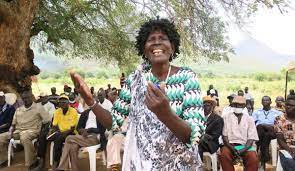In South Sudan, the world’s newest nation, livestock equals livelihoods.
Here, animals are valuable currency.
Cattle thefts in the payams of Chomakori, Lochumur and Najie [administrative divisions] they have left communities reeling.
“When we lose our cattle, it is very difficult for us to make ends meet,” says Taban Lokaayi, leader of a cattle camp in the Toposa community.
“I am happy to see UNMISS visiting us,” he tells the peacekeepers
“I speak for the residents of Kapoeta North when I say that we need to build bridges with neighboring communities, share services, usher in dynamic and prosperous trade in our markets, as well as pave the way for future development.
The current situation has created a lot of fear and instability, especially for women and children,” explains Mr. Lolimo.
His request: that the UN peacekeeping mission identify possible avenues of rapprochement between feuding cattle owners.
Francis Diu Shuei, Civil Affairs Officer and part of the joint patrol on the ground, responded to Mr. Lolimo’s request.
“We are here talking to all of you not only to assess the security situation on the ground, but also to assess how we can help you repair the peace dynamics here.
We are holding similar meetings with all parties to these ongoing cattle raids and are traveling to Kapoeta East and South as well as Budi,” he revealed.
“Our goal is to continually engage with all feuding communities and uncover possibilities for reconciliation that will stand the test of time.
For development and financial stability, peace is the first step,” he adds.
As of now, relations between the neighboring communities of Buya, Murle, Tenet and Toposa remain acrimonious, following recent cattle raids that involved some 15,000 head of cattle and claimed many lives.
In Budi, Lino Mertula Lechuk, paramount chief of the Buya based in the Kimotong and Napak payams, highlights what is perhaps the biggest threat of the frequent cattle raids: the involvement of young people.
“Since the youth of my community began to join the raids against our neighbors, we have suffered not only violence but also guilt.
The older generation understands that violence only leads to loss.
We want to reconcile with our brothers and sisters in Toposa, and collectively make sure that our youth begin to embrace a culture of peace,” he states simply but eloquently.
For its part, UNMISS continues to engage key community leaders, women and youth to reduce tensions and promote reconciliation activities.
Livestock raids are a key factor in inter-community conflict in South Sudan.







Thank you for your sharing. I am worried that I lack creative ideas. It is your article that makes me full of hope. Thank you. But, I have a question, can you help me?
Thanks for sharing. I read many of your blog posts, cool, your blog is very good.